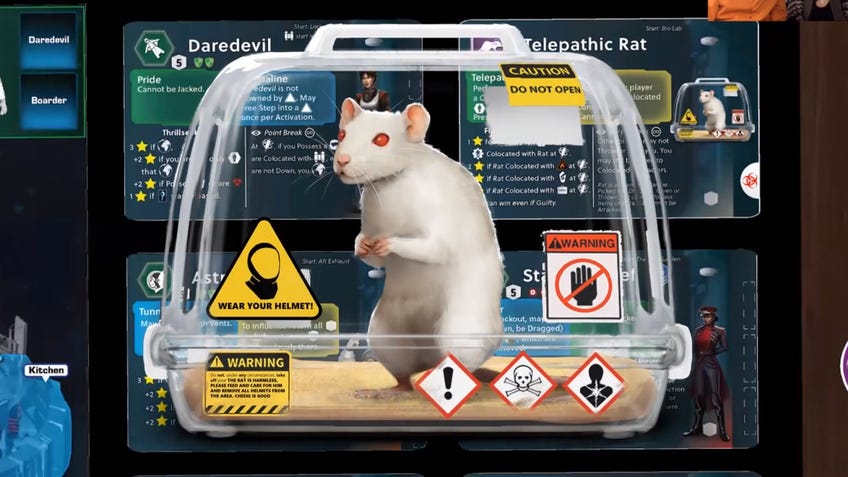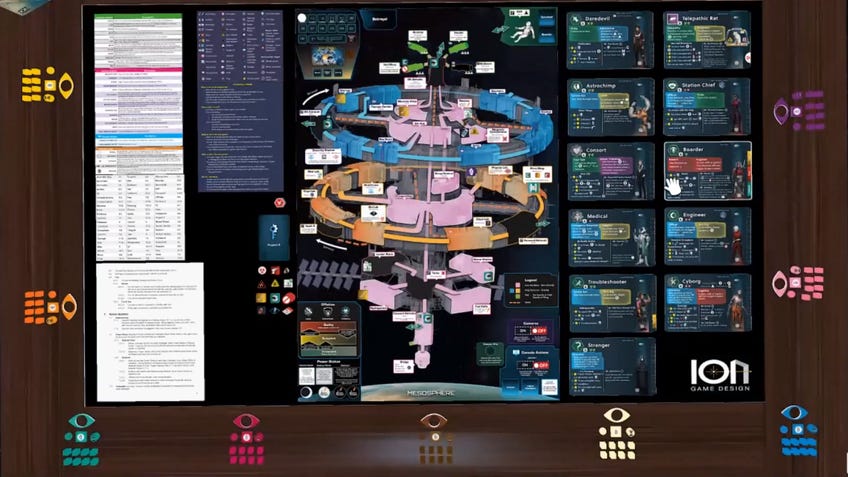Stationfall is like an Among Us board game where everyone has something to hide
Spacechimp seems sus.
Survive the collapse of a stellar research base in Stationfall, an upcoming board game that mixes deduction and hidden roles with a desperate action economy that tasks players to make it back to Earth with their lives - and secrets - intact.
A space station has been forced out of orbit and is hurtling inexorably towards earth. Everyone aboard has 15 minutes to escape with their lives before being cooked upon re-entry. Players will have to rely on each other to navigate the station, operate its quickly failing systems and jettison an escape pod into the mesosphere. A traitor or two among their ranks will attempt to sabotage these efforts, but that’s far from the only mystery.
Stationfall - published by Ion Game Design - puts one to nine players into the hermetically sealed shoes of the research base’s motley crew. Each Identity - whether that be a chimp in a flight suit, the medical android, the lead doctor with a split personality or the masked and cloaked Stranger - provides unique actions that affect what can be done during the session’s 10 to 14 rounds. Identities also determine who might ostensibly be a friend and an enemy at the outset of the game.
Rounds comprise the precious minutes between the present and the fiery conflagration that will eventually consume the station. Players begin the game with one of their Identities publicly revealed - the other roles remain hidden until they choose to pull back the curtain. On each minute, players will activate either their own character or a conspirator who has chosen to accept their influence. This pact works two ways and has its benefits, but it also means accepting the consequences of their hidden agenda.
Accruing and distributing Influence is one of Stationfall’s major economies: a player spreading themselves too thin will lose points at the end of the game, but hoarding influence does nothing but limit their available actions, perhaps keeping them from escaping with their lives. They could always bribe other players, which uses no influence but can be turned down. Bribes also affect scoring at the end of the game, making the choice even more fraught.
Alternatively, a player can deploy Kompromat they’ve gathered over the course of play - leveraging evidence that might implicate their secret identity in return for favours. A player has the option to turn this ploy down, but it will mark them as suspicious. That’s another of Stationfall’s main mechanical elements: all players begin as Innocent, but certain actions or abilities raise the general suspicion as to their intentions. Being fingered as guilty will bar most Identities from winning the game, so players will need to actively manage their image.

Scoring at the end of the game - the Stationfall phase - takes into account several factors, including assets (living and otherwise) extricated from the vessel, whether the player made it out dead or alive, how many friends and foes also escaped and unused bribes. Stationfall can always be triggered by events beyond the natural end of the game - armed antimatter or setting Experiment X loose in the confines are just two catastrophes that advanced an already limited time table.
Ion Game Design also published the award-winning Pax series by the father-and-son team of Phil and Matt Eklund, along with the environmental themed Bios strategy series. If Stationfall reads close to Among Us - a video game that exploded in popularity online during 2020 - the publisher would agree. In a tweet from March 25th revealing the game, it drew a direct connection and stressed the “intrigue and tension” built into the foundation of the board game.
The Kickstarter campaign for Stationfall will be active through May 16th, with backers able to secure the base game for £46 ($64). Shipping is expected to begin in December of this year, and those interested can download a print-and-play, non-final version or access a digital experience on Tabletop Simulator.

